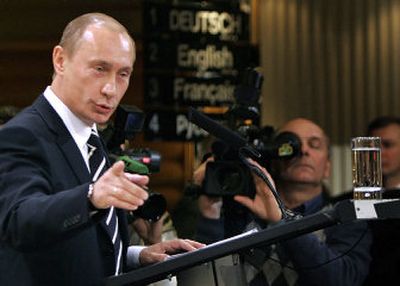Putin blasts U.S. policy

MUNICH, Germany – Russian President Vladimir Putin, in some of his harshest criticism of the United States since he took office seven years ago, said Saturday that Washington’s unilateral, militaristic approach had made the world a more dangerous place than at any time during the Cold War.
“The United States has overstepped its national borders in every way,” he said in an address at an annual international security conference here. “Nobody feels secure anymore, because nobody can take safety behind the stone wall of international law.”
Putin criticized the expansion of NATO, saying the alliance’s placement of military forces on Russia’s borders reduces “the level of mutual trust.” He said the U.S. desire to place antimissile systems in Eastern Europe could further upset the international balance of power and embolden the United States in its foreign policy decisions.
The Russian president defended his country’s arms sales to Iran as a way of reaching out to that Middle Eastern power, which is under pressure from the United States and Europe to curtail its nuclear program. Russia has supplied some air defense weapons to Iran because, he said, “we don’t want Iran to feel cornered.”
Dozens of foreign and defense ministers and other officials, including U.S. Defense Secretary Robert Gates and an American congressional delegation, attended the meeting.
Several U.S. politicians in attendance sharply criticized Putin’s remarks, which Russia specialists said were familiar in their assertiveness but unusual in their hostility toward the United States.
The White House also reacted strongly. “We are surprised and disappointed with President Putin’s comments,” spokesman Gordon Johndroe said in a statement. “His accusations are wrong. We expect to continue cooperation with Russia in areas important to the international community such as counterterrorism and reducing the spread and threat of weapons of mass destruction.”
The back-and-forth underscored the recent stark changes in U.S.-Russian relations. The friendship that was struck when President Bush met Putin and said he had looked into the former KGB colonel’s soul in 2001 has soured as the Kremlin suppressed political opposition at home, used its energy resources to pressure its neighbors and split with the White House over Iraq, Iran and other issues.
Bush has grown increasingly disaffected with Putin and occasionally tried to prod him to recommit to democracy and better relations with his neighbors, only to be sharply rebuffed.
During Putin’s 32-minute address, several members of the U.S. delegation frowned or looked away. Gates, a professional Sovietologist, stared down at notes he was writing. Asked for comment afterward, Gates smiled and shook his head.